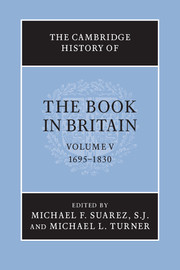Book contents
- Frontmatter
- Introduction
- PART I THE QUANTITY AND NATURE OF PRINTED MATTER
- PART II ECONOMIC, LEGAL AND CULTURAL CONTEXTS
- PART III THE TECHNOLOGIES AND AESTHETICS OF BOOK PRODUCTION
- PART IV THE BOOK TRADE AND ITS MARKETS
- I LONDON AND THE ‘COUNTRY’
- II TWO CASE STUDIES
- III SERIAL PUBLICATION AND THE TRADE
- IV THE INTERNATIONAL MARKET
- 26 Continental imports to Britain, 1695–1740
- 27 The English book on the Continent
- 28 The British book in North America
- 29 The British book in India
- V BOOKS AND THEIR READERS
- Abbreviations used in bibliography
- Bibliography
- Index
- Frontispiece
- Plate section
27 - The English book on the Continent
from IV - THE INTERNATIONAL MARKET
Published online by Cambridge University Press: 28 September 2010
- Frontmatter
- Introduction
- PART I THE QUANTITY AND NATURE OF PRINTED MATTER
- PART II ECONOMIC, LEGAL AND CULTURAL CONTEXTS
- PART III THE TECHNOLOGIES AND AESTHETICS OF BOOK PRODUCTION
- PART IV THE BOOK TRADE AND ITS MARKETS
- I LONDON AND THE ‘COUNTRY’
- II TWO CASE STUDIES
- III SERIAL PUBLICATION AND THE TRADE
- IV THE INTERNATIONAL MARKET
- 26 Continental imports to Britain, 1695–1740
- 27 The English book on the Continent
- 28 The British book in North America
- 29 The British book in India
- V BOOKS AND THEIR READERS
- Abbreviations used in bibliography
- Bibliography
- Index
- Frontispiece
- Plate section
Summary
In the history of intellectual exchanges between England and the Continent, the eighteenth century stands out as a period of special significance. In all of the major and many of the minor European countries, the literature of England was absorbed to an extent and with an intensity which only a new word, current in the second half of the century, could describe accurately – Anglomania. The flow of ideas from England to continental Europe began in the last decades of the seventeenth century and continued uninterrupted into the nineteenth. It was not confined to the belles-lettres and humaniora, but included many other, if not all, fields of contemporary knowledge.
There were, of course, political reasons for this interest in English life and letters. The accession of William of Orange to the English throne in 1688 strengthened relations between Holland and England, and the Hanoverian succession in 1714 brought Germany and England closer together, though the English disliked George as much as he did them. Nevertheless, the spell which England cast on the Continent was not primarily due to dynastic affiliations. It originated in a political and cultural pre-eminence, which was widely praised and held up, often in the wake of Voltaire’s Lettres philosophiques, as an idealized model for other European countries.
- Type
- Chapter
- Information
- The Cambridge History of the Book in Britain , pp. 523 - 543Publisher: Cambridge University PressPrint publication year: 2009

